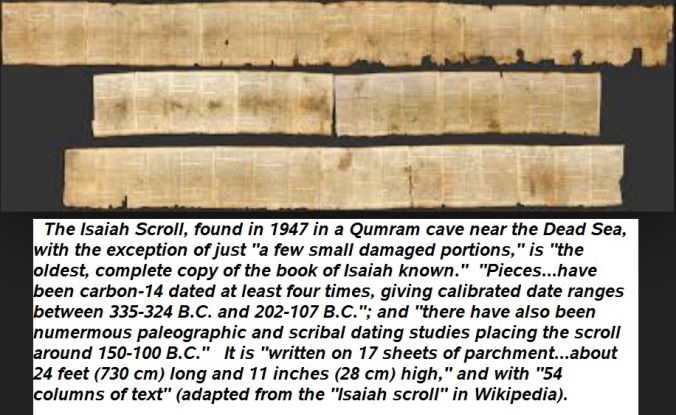“Go therefore and make disciples of all the nations…teaching them to observe all that I commanded you; and lo, I am with you always, even to the end of the age” (Matthew 28:19-20, NASB).
——————–
Contents:
1) Can We Believe the Bible? (Dan King)
2) God is Concerned About “Little Things,” Too (Paul Earnhart)
——————–

-1-
Can We Believe the Bible?
Dan King
Question:
“What proof do we have that we can trust the Bible for everything it says? The Bible has been handed down so many times. The translation has been changed, and everybody knows when you’re passing on information the meaning never comes back the way it originated. One word changed can change the whole meaning of the passage. The Bible was written so long ago how do we know its meaning is still the same and how do we know it’s not just another man-made project?”
Answer:
The poof that you ask about is found in many places.
First, there is archaeology. Archaeologists have uncovered evidence in many places and from across many centuries about many different aspects of the Bible. For example, at one time skeptics doubted whether the Hittites, which are mentioned only briefly and with little detail in the Genesis account, actually ever existed at all. Eventually archaeological discovery in Asia Minor uncovered an entire civilization, with their distinctive culture, language and history. The simple biblical references were found to be representative of a people who settled and traded throughout the entire ancient Near East in the time of Abraham and the other patriarchs.
Many biblical cities have been uncovered and excavated to reveal distinctive events such as destruction layers which coincide with the biblical story of the Exodus from Egypt and capture of many of the cities of ancient Canaan in the books of Joshua and Judges. Many other such things are well attested in both the literature of the other peoples and from excavation activities. For example, during the fall of Jerusalem in 587 B.C., the book of Jeremiah (with 2 Chronicles and 2 Kings) represents the fall of the surrounding cities while Jerusalem lay under siege. In the excavation of the city of Lachish, the so-called “Lachish letters” were found, which detail the gradual capture of the towns precisely as Jeremiah and the books of history describe. Furthermore, it mentions some who were “weakening the hands of the people” in the midst of the siege, which is precisely the charge leveled against Jeremiah in the book by his name. There are many other things, far too numerous to mention here, which establish the general tenor of the biblical writings as recording genuine history.
Further, as to the fact that the Bible has been handed down to us in the Hebrew Old Testament and the Greek New Testament through many hands and many centuries, let it be noted that the Bible is the best attested ancient book in the entire world. There are literally thousands of copies of both the OT and the NT in their original languages which have come down to us — some of them extremely ancient. For example, many copies of the Dead Sea Scrolls (Hebrew manuscripts of OT books) go back to the first century before the time of Jesus, others perhaps even a century earlier than that. If we may trust that we have the works of Plato, Aristotle, Seneca, and the host of other ancient writers whose materials are not nearly so well attested, why would we not also be able to believe that we have the precise words of Christ and his apostles, as well as those of Moses and the Old Testament prophets?
As to whether the words were changed in the process of time and transmission to our day, you must remember that the transmitters (scribes) of ancient times were extraordinarily careful, believing that a curse from heaven was upon the one who would change even a single word of Holy Scripture (see Deut. 4:2; 12:32; Matt. 5:18; Rev. 22:18,19). But since mistakes did occasionally occur because of oversights and writing errors, it was the hundreds of other copies of the scripture that acted as a countermeasure to assure the mistakes could be corrected.
This process of establishing the original text has come to be called “the science of textual criticism.” The translation process itself is really the most convincing part. Think of all the translations there are out there — literally hundreds of different ones in the English language alone. Take a few translations and compare them side by side. You know what happens? You come up with very little difference between them. Most only differ in the different ways of saying the exact same things!
The ultimate answer is YES, we can definitely trust the Bible.
— Via bulletin articles from the Collegevue church of Christ, August 28, 2016
——————–
“To these He also presented Himself alive after His suffering, by many convincing proofs, appearing to them over a period of forty days and speaking of the things concerning the kingdom of God” (Acts 1:3).
——————–

-2-
God is Concerned About “Little Things,” Too
Paul Earnhart
The order of Jesus’ model prayer makes clear that the glory of God and the accomplishing of His will in the world must always be at the heart of the life and thinking of the Christian. His prayers, like his life, should begin and end there. It is on just such a note that the section of the sermon which contains this instructive prayer concludes (Matthew 6:33). Yet this does not preclude the bringing of our own needs and burdens to God’s throne. This is made evident by the three (some say four) concluding requests of the prayer (Matthew 6:11-13). These all center on basic human necessities.
“Give us this day our daily bread” (Matthew 6:11). With these words the Lord makes a sudden shift from the exalted to the commonplace. The apparent discontinuity of it caused many of the ancient commentators to spiritualize the “bread,” but there is nothing in the context to justify it. On the face of things it just seems that physical considerations should be left till last, after forgiveness and the the strength to endure temptation. But that is not where Jesus put them (either here or in Luke 11:2-4). He certainly does not intend that physical necessities become life’s overriding concern (Matthew 6:19-32) but He is also not discounting their importance. The “Word” who became flesh understood from experience the bodily needs of men (Hebrews 2:18; 4:15) and demonstrated how seriously He took them in His compassion for the sick and hungry (Mark 1:40-41; Matthew 15:32; 25:41-43). The inclusion of this brief petition demonstrated that there is no matter so small that we may not with confidence bring it to our Father. Paul urges this: “Be anxious for nothing, but in everything by prayer and supplication… let your requests be made known to God” (Philippians 4:6). Peter says the same: “Casting all your care upon Him, for He cares for you” (1 Peter 5:7). Once we have determined to do His will at all costs, we may speak freely to Him of all our needs from the least to the greatest.
This simple petition speaks not only of God’s wide-ranging concern but of our own complete dependence on Him. “Bread” as here used likely stands for all of life’s bodily needs — food, shelter, health, family, etc. In any case we cannot by our own unaided strength supply one of them. As Clovis Chappell once observed, we could no more create one loaf of bread than we could create the universe. “The earth is the LORD’S, and all its fullness” (Psalm 24:1). Hence we have no real choice but to trust God even at the most elemental level.
The English translation “daily bread” is somewhat of an educated guess since the Greek word for “daily” occurs nowhere else for certain in Greek literature. It may suggest bread for the day ahead or bread sufficient to sustain us. In either case Jesus teaches us to ask for no more than a day’s supply. This is a tough assignment for people like ourselves who are inclined to fall to pieces without a lifetime provision in hand and fully insured. If we follow the Lord’s counsel we will quit trusting in bread (John 6:25) and learn to lean wholly on God and His promises. Learning to live trustingly with what we have each day calls to mind God’s manna experiment with Israel while they were in the wilderness. “He humbled, you,” wrote Moses, “allowed you to hunger, and fed you with manna… that He might make you know that man shall not live by bread alone; but man lives by every word that proceeds from the mouth of the LORD” (Deuteronomy 8:3). Jesus had used this passage once to great advantage (Matthew 4:4). We can do the same.
However much, then, it might have seemed at first that this prayer for bread was prayer from a very low ground, it turns out to have powerful spiritual benefit. It teaches us faith. And this is a prayer for the poor and the rich alike; for no matter how little or how much we have or how hard we struggle to obtain and keep it, God alone can secure it. If we will learn to trust Him, God’s children can live serenely in the confidence once expressed by the aged David: “I have been young, and now am old; yet I have not seen the righteous forsaken, nor his descendants begging bread” (Psalm 37:25). And if we learn this kind of
trust about bread, it will free us to get about the things that are even more important.
— Via Articles from the Douglas Hills church of Christ, January 1, 2016
——————–
The Steps That Lead to Eternal Salvation
1) Hear the gospel, for that is how faith comes (Rom. 10:17; John 20:30,31).
2) Believe in the deity of Christ (John 8:24; John 3:18).
3) Repent of sins (Luke 13:5; Acts 17:30).
4) Confess faith in Christ (Rom. 10:9,10; Acts 8:36-38).
5) Be baptized in water for the remission of sins (Mark 16:16; Acts 2:38; 22:16; Rom. 6:3,4; Gal. 3:26,27; 1 Pet. 3:21).
6) Continue in the faith, living for the Lord; for, if not, salvation can be lost (Heb. 10:36-39; Rev. 2:10; 2 Pet. 2:20-22).
——————–
Tebeau Street
CHURCH OF CHRIST
1402 Tebeau Street, Waycross, GA 31501
Sunday services: 9:00 AM (Bible class); 10 AM & 5 PM (worship)
Wednesday: 7 PM (Bible class)
evangelist/editor: Tom Edwards (912) 281-9917
Tom@ThomasTEdwards.com
http://thomastedwards.com/go (Older version of Gospel Observer website without pictures, but back to March 1990)
http://tebeaustreetchurchofchrist.org/
http://ThomasTEdwards.com/audioser.html (audio sermons)
















